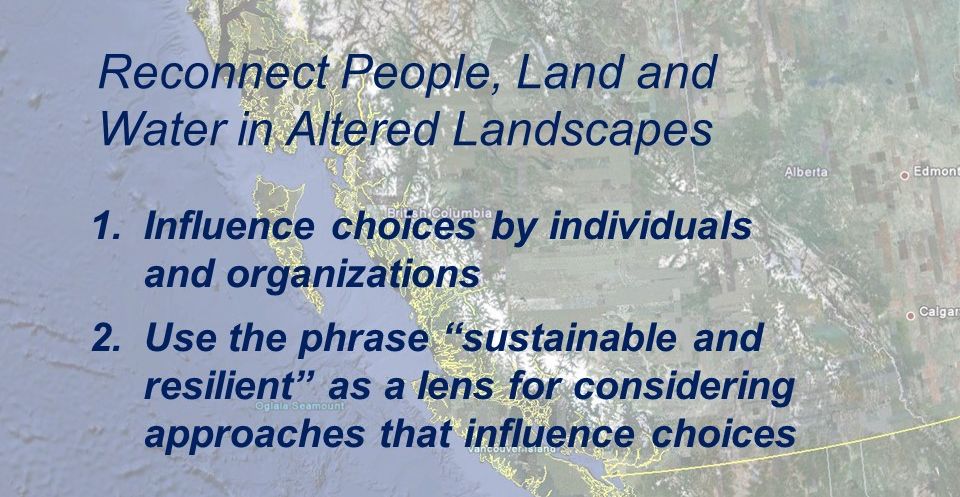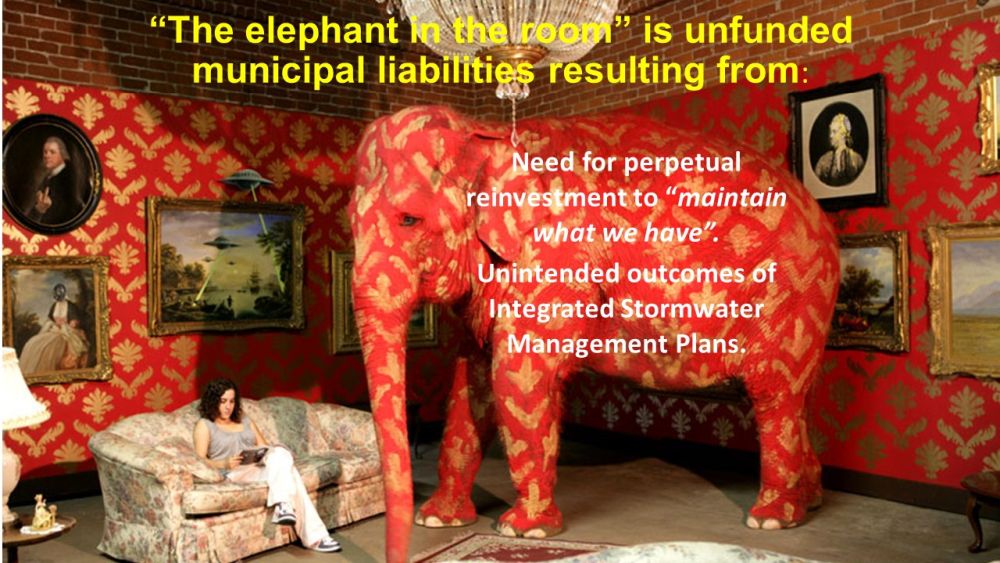BEING IN BALANCE IS THE FOUNDATION FOR SUCCESSFUL COLLABORATION WITHIN LOCAL GOVERNMENT: “Staff gives good advice and Council makes the decision – the operative phrase is a respect-based relationship,” stated Peter Steblin, Chief Administrative Officer with the City of Coquitlam, when he reflected on the ingredients for good decision-making
Note to Reader:
Waterbucket eNews shares the stories of those who embrace “design with nature” approaches to reconnect people, land and water in altered landscapes. We celebrate the commitment, hard work and perseverance of individuals and groups who lead by example to make a difference for the common good.
In this edition, we shine the spotlight on the City of Coquitlam, British Columbia’s 6th largest municipality with a population of 140,000. Peter Steblin provides insight into what he believes is achievable when the working relationship between a City Council and Staff is founded on mutual respect and is in balance.

EDITOR’S CONTEXT:
“Pete Steblin is a city manager and a professional engineer. He has an extensive background in both drinking water and liquid waste, was the Chair of the Canadian Water Network for 10 years, and was selected as one of North America’s Top 10 Public Works Leaders by the American Public Works Association. While he is no longer on the frontlines of managing water issues, Peter Steblin says that he “still has a strong interest and likes following recent developments”.” stated Kim Stephens, Waterbucket eNews Editor and Executive Director, Partnership for Water Sustainability in British Columbia.
 “After the Partnership released A Celebration of Our Story on the 10th anniversary of incorporation, Peter Steblin reached out to me with a story idea. We then had a conversation, and the outcome is an article that I hope readers will find illuminating. Peter’s “story behind the story” is insightful and has universal application. His storyline is built around three words of wisdom: Trust, Time and Think.”
“After the Partnership released A Celebration of Our Story on the 10th anniversary of incorporation, Peter Steblin reached out to me with a story idea. We then had a conversation, and the outcome is an article that I hope readers will find illuminating. Peter’s “story behind the story” is insightful and has universal application. His storyline is built around three words of wisdom: Trust, Time and Think.”
“One of Peter Steblin’s trademark qualities is to “tell it like it is”. Case in point –in 2003, the City of Coquitlam amended its Official Community Plan and pioneered a watershed-based approach to community planning. We told that story in our Watershed Case Profile Series.”
“The last step in the story development process was a roundtable session of senior managers convened by Peter Steblin. Prompted by his expressed wish not to sugercoat a tumultuous period, I added a front-end titled ‘The Story Behind the Coquitlam Story’. The quote below is extracted from the document and illustrates how Peter Steblin tells it like it is.”
QUOTABLE QUOTE – Peter Steblin, January 2014
“We have arrived at a good place, but the journey has not been easy. In fact, we had to work our way through some pretty contentious periods. We persevered, we adapted, and we progressed. We want other local governments to know about the good, the bad and the ugly of the Coquitlam story so that they may learn from our experience and know that it is okay to stumble.”
To Learn More:

“Staff gives good advice and Council makes the decision”
“I receive the weekly stories published by the Partnership for Water Sustainability and always enjoy reading the perspective that Kim Stephens provides in his Editor’s Context,” stated Peter Steblin.
 “When I read the historical document about the 10th anniversary of the Partnership’s incorporation, I liked how Kim honoured Tom Heath and others who made important contributions in laying the Partnership foundation in the preceding two decades.”
“When I read the historical document about the 10th anniversary of the Partnership’s incorporation, I liked how Kim honoured Tom Heath and others who made important contributions in laying the Partnership foundation in the preceding two decades.”
“The document reminded me that in those early decades, there was insufficient attention placed on water issues when managing City-wide issues. I think the Partnership clearly has succeeded in its mission as there is a lot more focus on water issues these days.”
“As a City Manager responsible for balancing many competing needs, I notice that nowadays not enough attention is being placed on the cost-effectiveness of environmental (including water) issues. As a result, billion dollar programs are being advocated which I believe have questionable business cases associated with them.”
“So, I reached out to Kim Stephens and asked whether Waterbucket eNews would consider drawing attention to the issue. Sure, he replied by email, and pointed out that ‘affordable and effective’ is a guiding principle for the work of the Partnership in supporting local government.”
“Kim and I then had a conversation on Zoom which lasted several hours and proved really helpful in crystallizing the storyline that I wished to share with the Waterbucket eNews audience.”
The Elephant in the Room: An Example
Below, this slide from a 2008 presentation to Metro Vancouver elected representatives by the advisory Liquid Waste Management Reference Panel speaks to the issue of questionable business cases raised by Peter Steblin in his comments above.

Quotable Quote:
“The ISMP process is a sleeper issue because there are 130 watersheds in Metro Vancouver,” Kim Stephens, Chair of the Reference Panel, informed the Metro Vancouver Waste Management Committee in July 2008. “The total capital cost flowing from ISMPs could easily equal the $1.4 billion cost of sewage treatment, yet there has been little discussion about guiding philosophy or cost implications. While $1.4 billion is a big number, the long-term costs associated with a continuation of the old-business-as-usual are believed to be even greater. This is the elephant in the room “
To Learn More:
DOWNLOAD A COPY OF Re-Focus Integrated Stormwater Management Plans on outcomes, recommends Metro Vancouver Reference Panel.

“The Three Ts” – Trust, Time, Think
“When I reflect on the big picture beyond the City of Coquitlam, I believe that society has lost the ability to discern what is truly important or how to apply judgement. In the process, accountability is lost, and buzz words are used to mask the lack of a proper business case,” continued Peter Steblin.
“At the City of Coquitlam, we try very hard to ensure our organization always makes decisions based on a wide variety of factors. But through it all, we have our feet planted very firmly on the ground. It is simply a matter of taking whatever issue is before us, analyzing it, and being wise with respect to how to do things.”
What It Means to have an Appreciative Community
“Local government is on the frontlines. Our taxpayers challenge our Councillors all the time, and this establishes accountability. The further removed one is from the frontlines, the less that the accountability link seems to be there.”
“We are very fortunate in Coquitlam to have a great Council, and that is because we have what I call a very appreciative community. Voters elect balanced, reasonable Councillors that generally believe that the City is well managed. And so, Council listens to Staff. That is very valuable indeed.”
“I count my blessings that, as City Manager, I am in a situation where being reasonable is appreciated and valued, and Council listens to my advice. When Councillors are debating an issue, I do not jump in too quickly. It is about Council having the discussion. And if Council cannot find a compromise and is looking for help in that regard, only then do I facilitate a way forward that is based on a reasonable outcome that is affordable.”
What It Means to Be in Balance
“At the end of the day, good decision-making comes down to a good process. But it also relies on wisdom in terms of balanced advice. And it comes with an accountable, political group of elected representatives that make the decisions.
“Over my career, I have worked in four cities, and observed many cities across the country. This experience provides me with context for concluding that we have something really good going on in the City of Coquitlam. I have never yet seen a relationship between the administration and Council that is so positive and healthy. The operative phrase is respect-based.”
“An airplane analogy is one way to describe the relationship. Think of one wing as political and the other as administration. If either wing is not functioning properly, the plane will crash. In Coquitlam, we are in balance. Council runs the show. We give good advice.”
What It Means to have Synergy
“Balance is key to good government. One needs good administrative expertise to advise and serve the political arm. At the same time, the political arm has to trust the administrative arm. The two arms must work together. Council buy-in follows when Council fundamentally respects the work that Staff does. In Coquitlam, respect has grown over time. It would not be possible without a really wise, good servant’s heart within the Council table.”
TRUST:
“At the present time, there is a significant level of trust in our technical recommendations. Rarely will Council over-ride them. Yes, they will challenge us. We will explain our recommendations. And then they will make the decision. There is a good synergy. Having said that, trust is fragile and can easily be broken. We need to be vigilant in that regard as decades of good work can be lost if trust is lost.”
TIME:
“If everything is a priority, nothing is a priority! We take the ‘reality of time’ into consideration when we set workload priorities in Coquitlam. We rank them as A, B or C because this allows us to manage timelines effectively. This approach has helped Council focus on what is most important to make progress over time. In combination with the trust factor, the priority-setting process results in a healthy interaction between Council and Staff.”
THINK:
“We are not perfect. We struggle, for example, with challenges related to blindly following standards of practice. Yes, standards are important. But an over-reliance on standards encourages staff to ‘park their brains at the door’. Too often, that can lead to unsuitable or unsustainable solutions. This is why I encourage staff to think about compromises and maximizing the benefit for the money spent,” concludes Peter Steblin.


